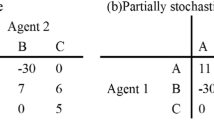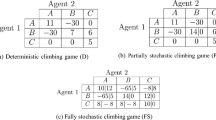Abstract
In cooperative multiagent systems, an agent often needs to coordinate with other agents to optimize both individual and system-level payoffs. A lot of multiagent learning approaches have been proposed to address coordination problems in discrete-action cooperative environments. However, it becomes more challenging when faced with continuous action spaces, e.g., slow convergence rate and convergence to suboptimal policy. In this paper, we propose a novel algorithm called CALA-rFMQ (Continuous Action Learning Automata with recursive Frequency Maximum Q-Value) that ensures robust and efficient coordination among multiple agents in continuous action spaces. Experimental results show that CALA-rFMQ facilitates efficient coordination, and outperforms previous works.
Access this chapter
Tax calculation will be finalised at checkout
Purchases are for personal use only
Similar content being viewed by others
References
Thathachar, M., Sastry, P.: Networks of Learning Automata: Techniques for Online Stochastic Optimization. Kluwer Academic Publishers, Boston (2004)
Bowling, M., Veloso, M.: Multiagent learning using a variable learning rate. Artif. Intell. 136(2), 215–250 (2002)
Tuyls, K., Now, A.: Evolutionary game theory and multi-agent reinforcement learning. Knowl. Eng. Rev. 20(1), 63–90 (2005)
Kapetanakis, S., Kudenko, D.: Reinforcement learning of coordination in cooperative multi-agent systems. In: AAAI/IAAI, pp. 326–331 (2002)
Matignon, L., Laurent, G.J., Le Fort-Piat, N.: Independent reinforcement learners in cooperative markov games: a survey regarding coordination problems. Knowl. Eng. Rev. 27(1), 1–31 (2012)
Hao, J., Huang, D., Cai, Y., et al.: The dynamics of reinforcement social learning in networked cooperative multiagent systems. Eng. Appl. Artifi. Intell. 58, 111–122 (2017)
Claus, C., Boutilier, C.: The dynamics of reinforcement learning in cooperative multiagent systems. In: Proceedings of the Fifteenth National Conference on Artificial Intelligence, pp. 746–752 (1998)
Lauer, M., Riedmiller, M.: An algorithm for distributed reinforcement learning in cooperative multi-agent systems. In: Proceedings of the Seventeenth International Conference on Machine Learning (2000)
Chen, X., Duan, Y., Houthooft, R., et al.: Infogan: interpretable representation learning by information maximizing generative adversarial nets. In: Advances in Neural Information Processing Systems, pp. 2172–2180 (2016)
Ray, S.S.: Numerical Analysis with Algorithms and Programming. CRC Press, Boca Raton (2016)
Alibekov, E., Kubalk, J., Babuka, R.: Policy derivation methods for critic-only reinforcement learning in continuous spaces. Eng. Appl. Artif. Intell. 69, 178–187 (2018)
Sutton, R.S., Maei, H.R., Precup, D., et al.: Fast gradient-descent methods for temporal-difference learning with linear function approximation. In: Proceedings of the 26th Annual International Conference on Machine Learning, pp. 993–1000. ACM (2009)
Galstyan, A.: Continuous strategy replicator dynamics for multi-agent Q-learning. Auton. Agents Multi-Agent Syst. 26(1), 37–53 (2013)
Lillicrap, T.P., Hunt, J.J., Pritzel, A., et al.: Continuous control with deep reinforcement learning. arXiv preprint arXiv:1509.02971 (2015)
Peters, J., Schaal, S.: Reinforcement learning of motor skills with policy gradients. Neural Netw. 21(4), 682–697 (2008)
Van Hasselt, H.: Reinforcement learning in continuous state and action spaces. In: Wiering, M., van Otterlo, M. (eds.) Reinforcement Learning, pp. 207–251. Springer, Heidelberg (2012). https://doi.org/10.1007/978-3-642-27645-3_7
Van Hasselt, H., Guez, A., Silver, D.: Deep reinforcement learning with double Q-Learning. In: AAAI 2016, pp. 2094–2100 (2016)
Lazaric, A., Restelli, M., Bonarini, A.: Reinforcement learning in continuous action spaces through sequential Monte Carlo methods. In: Advances in Neural Information Processing Systems, pp. 833–840 (2008)
De Jong, S., Tuyls, K., Verbeeck, K.: Artificial agents learning human fairness. In: Proceedings of the 7th International Joint Conference on Autonomous Agents and Multiagent Systems, AAMAS 2008, vol. 2, pp. 863–870 (2008)
Acknowledgments
The work is supported by the National Natural Science Foundation of China under Grant No.: 61702362 and Special Program of Artificial Intelligence of Tianjin Municipal Science and Technology Commission (No.:569 17ZXRGGX00150).
Author information
Authors and Affiliations
Corresponding author
Editor information
Editors and Affiliations
Rights and permissions
Copyright information
© 2018 Springer International Publishing AG, part of Springer Nature
About this paper
Cite this paper
Liu, W., Zhang, C., Yang, T., Hao, J., Li, X., Bao, Z. (2018). Achieving Multiagent Coordination Through CALA-rFMQ Learning in Continuous Action Space. In: Geng, X., Kang, BH. (eds) PRICAI 2018: Trends in Artificial Intelligence. PRICAI 2018. Lecture Notes in Computer Science(), vol 11013. Springer, Cham. https://doi.org/10.1007/978-3-319-97310-4_15
Download citation
DOI: https://doi.org/10.1007/978-3-319-97310-4_15
Published:
Publisher Name: Springer, Cham
Print ISBN: 978-3-319-97309-8
Online ISBN: 978-3-319-97310-4
eBook Packages: Computer ScienceComputer Science (R0)




